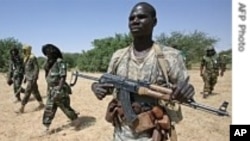BENTIU —
A senior South Sudanese military officer allied to former Vice President Riek Machar has warned Sudanese rebels from the Justice and Equality Movement (JEM) not to get involved in the South Sudan conflict.
James Koang Chuol, the SPLA Fourth Division Commander who defected from the army and seized control of Bentiu, the capital of oil-rich Unity state, days after fighting began in Juba on Dec. 15, says JEM rebels, who have been fighting the Khartoum government, mainly in Darfur, have occupied Unity's Pariang county on the border with Sudan.
Chuol says he believes the Sudanese rebels want to secure a key supply route, which runs through Unity state to the town of Kauda in Sudan.
But he warned JEM that his troops will forcibly dislodge them from Pariang unless they pull out within two days.
He also told the Sudanese rebels that the conflict in South Sudan does not concern them.
"These are South Sudanese fighting themselves...There is no need for involvement by other people,” he said.
An aid worker in Yida refugee camp in Unity state, who spoke on condition of anonymity, said he had seen JEM rebels with armored vehicles, weapons and ammunition passing through the refugee camp on their way to Pariang on Friday.
Chuol also said his troops killed more than 50 fighters loyal to President Salva Kiir and seized weapons and vehicles, including two tanks, in fighting in Wangkei, in Unity state's Mayom county, at the weekend.
VOA News was unable to contact SPLA spokesman Philip Aguer to confirm Chuol's claims.
Chuol seized power in Unity and declared himself governor of the oil-rich state on December 21, following an outbreak of violence in Juba six days earlier that the government has said was an attempted coup, led by Machar.
The former vice president has denied the charges, saying the violence was triggered by a dispute between members of the Presidential Guard Brigade from his Nuer ethnic group and Kiir's majority Dinka tribe. The two largest ethnic groups in South Sudan have a long history of bitter and often deadly disputes.
The United Nations has said at least 1,000 people have died in 15 days of fighting in South Sudan that rapidly spread from Juba to Jonglei state, and the two oil-producing states of Unity and Upper Nile.
James Koang Chuol, the SPLA Fourth Division Commander who defected from the army and seized control of Bentiu, the capital of oil-rich Unity state, days after fighting began in Juba on Dec. 15, says JEM rebels, who have been fighting the Khartoum government, mainly in Darfur, have occupied Unity's Pariang county on the border with Sudan.
Chuol says he believes the Sudanese rebels want to secure a key supply route, which runs through Unity state to the town of Kauda in Sudan.
But he warned JEM that his troops will forcibly dislodge them from Pariang unless they pull out within two days.
He also told the Sudanese rebels that the conflict in South Sudan does not concern them.
"These are South Sudanese fighting themselves...There is no need for involvement by other people,” he said.
An aid worker in Yida refugee camp in Unity state, who spoke on condition of anonymity, said he had seen JEM rebels with armored vehicles, weapons and ammunition passing through the refugee camp on their way to Pariang on Friday.
Chuol also said his troops killed more than 50 fighters loyal to President Salva Kiir and seized weapons and vehicles, including two tanks, in fighting in Wangkei, in Unity state's Mayom county, at the weekend.
VOA News was unable to contact SPLA spokesman Philip Aguer to confirm Chuol's claims.
Chuol seized power in Unity and declared himself governor of the oil-rich state on December 21, following an outbreak of violence in Juba six days earlier that the government has said was an attempted coup, led by Machar.
The former vice president has denied the charges, saying the violence was triggered by a dispute between members of the Presidential Guard Brigade from his Nuer ethnic group and Kiir's majority Dinka tribe. The two largest ethnic groups in South Sudan have a long history of bitter and often deadly disputes.
The United Nations has said at least 1,000 people have died in 15 days of fighting in South Sudan that rapidly spread from Juba to Jonglei state, and the two oil-producing states of Unity and Upper Nile.




